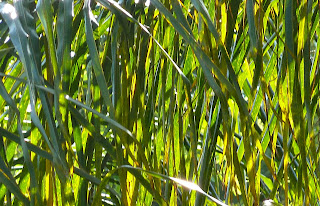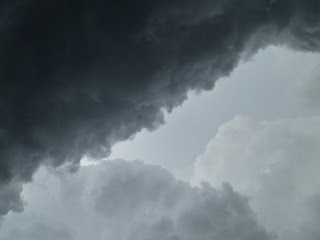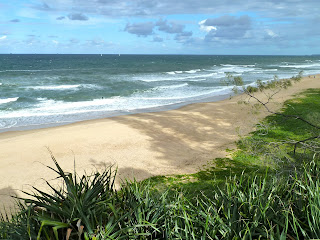I've worked with words all my adult life: first in book publishing; then as a ghostwriter; and, most recently, in magazines. It's hard for me to think, 'it's only words'. I love the use of language and the evolution of that usage. I'd like to think I'm not a stickler for grammar, but I have been known to get a bit cranky about the incorrect positioning of apostrophes. And the proliferation of dangling modifiers.
I've been thinking about writing this post for a long time, but I'm still not sure where to start. Perhaps with a headline I spotted earlier in the year: 'Furious Queenslanders dob in flood rorters'*. One of the attractions of coming to live in Australia was that we wouldn't have to learn a new language. In theory.
Some Australian phrases I can work out from the context, even though we'd never say it in English. Some words you might find in an English dictionary but are seldom used: coronial enquiry; land gale; mortgage delinquency; muscle car; nature strip (grass verge); rort; swiftwater rescue; victimology.
Sometimes, even the simplest usage can be confusing. When you went into the CBD, did you find a park? Yes, the Botanic Gardens were lovely. No, no, a parking space.
Other times I haven't got a bloody clue what you're on about, mate. When I'm at the supermarket checkout; do I have flybuys? Talking to a neighbour; have I seen the body corporate rules? What on earth are camel packs? Does a muffler shop sell gloves, too?
Here's some help with translation:
Aussie battlers = struggling, lower-income families
backflip = U-turn (in politics)
bail up = to corner someone
bastardry = malicious or cruel behaviour
biffo = punch-up
billabong = stagnant pool
billy = small pot used by a bushman
blackfellas = Aborigines (blackfellas is not offensive;
Abos is)
blacktop = tarmacked road
bloodnut = redhead
bogan = ill-educated person from low-income demographic**
bowser = petrol pump
camel pack = hydration pack worn on the back
chook = hen, chicken
cream = to beat
diggers = soldiers
doona = duvet or quilt
dudded = swindled
dunnie = toilet
durrie = cigarette
esky = cooler box
eventuate = to happen
fair dinkum = genuine; expression of surprise/acknowledgment
farewell = to lay to rest; give a send-off
freedom camping = not using a campsite
gerni = to (high-pressure) hose down
grass slashing = mowing the lawn
hoon = someone who drives fast and dangerous to show off
icy pole = ice lolly
ladder = league table
lolly = sweetie
lounge = sofa
lounge room = lounge
manchester = bed linen
ocker = a stereotypical Australian
onya (goodonya) = good for you, well done
over it = had enough
recreate = to spend leisure time
ridgy didge = all right, genuine, true
rort = dishonest practice
sanga = sandwich
scats = animal droppings
singlet = vest or vest T-shirt
skips = English-descent Australians (quite rude)
slasher = tractor-mounted mower
spruik = to harangue
squib = to flee, escape, be cowardly
stoush = fight or dispute
thongs = flip-flops
top score = to achieve the highest number of runs, goals etc
tucker = food
unit = apartment
whipper-snipper = strimmer
wog boys = Greek or other Southern Europeans (not offensive)
verbal = to twist what an opponent says in a debate
youse = you (plural)
Sayings
There are lots, of course, but these are some favourites:
He couldn't make a decision if a train was about to hit him
He couldn't raffle a chook in a pub (useless)
I'm flat out like a lizard drinking (busy)
She was as mad as a bag of cut snakes
To throw an echidna among the balloons (upset the apple cart)
As nervous as a long-tailed cat in a room full of rocking chairs
Don't be a galah (stupid)
Don't come the raw prawn with me (treat me like an idiot)
Whatever blows your skirt up
He couldn't lie on a bed straight
To do a Maralinga (do the dirty on someone)
She'll be apples (it's OK)
Short forms
Everybody knows the Aussies love short forms:
Abo, ambo (paramedic/ambulance), arvo, avo, barbie, bikie, boardies (surfer's long shorts), breakie, Chrissie, chrysies (chrysanthemums), cosie (swimsuit), doco (documentary), footie (rugby or Aussie Rules), freshie (fresh water crocodile), garbos (dustbin men), hedgies (hedge cutters, clippers or trimmers), journo, kindie (kindergarten), leggie (leg rope attaching a board to a surfer's leg), pines (pineapples), pollies, postie (postman), Quickie (Quiksilver surf and lifestyle brand), rashie (rashguard, protective swimwear), rego (registration plate), rellies, renos (renovations), saltie (saltwater crocodile), schoolies (Year 12s and their end-of-school celebrations), servo (petrol station), sunnies, toolies (attendees at the schoolies' end-of-final-year celebrations but who left school last year or even longer ago), tradie, ute (utility vehicle)
And place names don't escape: Breakie Creek, Brizzie, Coochie (Coochiemudlo Island), Freo (Freemantle, WA), The Gabba (stadium in Woolloongabba, South Brisbane), Rocky (Rockhampton), Rotto (Rotnest Island, WA), the Sunnie (Sunshine) Coast, Straddie (North Stradbroke Island), Tassie
Maybe it's just too hot to be bothered to say the whole word.
Verbosity and tautology
The Aussies may abbreviate loads of words, but sometimes their sentences are massively overcomplicated. On the back of a charity Christmas card we were sent it said: 'Spotlight's Stitch in Time program is committed to enriching and supporting positive community development outcomes'. Eh?
Signs especially tend to be over-long. I can't help thinking 'Beware of snakes' would be more immediate and therefore more helpful than...

I mean, have any snakes been seen recently? There's a sort of inference that, even though snakes have been seen, they've never been a problem. Whereas everybody should be on guard against snakes at all times, even if there's only the vaguest possibility that one might appear. And what about simply 'No tipping' instead of...
I don't really know where to start with the sign below. The verb to swoop is intransitive, which means it can't have a direct object. Magpies swoop on, or upon, an intruder. An important piece of information is missing: when is the breeding season? And the advice to carry an umbrella: is it to beat off an attacker or open as a protective shield? How many people will bother to read all this?
Fish cleaning is prohibited on seats on the little ferry over to Coochiemudlo Island. To be honest, I'd rather there was no fish cleaning at all. I don't even want to see fish innards on the floor. How quaint that the ferry operator should tell us what the seating is for. In all my years of looking at signs, I've never considered what Notice means at the top of a notice? I know that what I am reading is a notice; so is it telling me to Take notice because it's saying something important? Does it really mean Attention or Warning?
By the way, something is either prohibited, or not. It cannot be partially or totally prohibited. And to prohibit prohibited goods is tautology.
'Like a drowned man floating to the surface of the dam', Booker Prize-winning Australian author Peter Carey wrote in Theft. A dam is a construction that blocks a river, creating a lake, not the lake itself, goddamit. Travel brochures describe dams stocked with fish. No. Fish don't swim in concrete or rock. If I lived here until I was 100 I could never bring myself to call a lake a dam.
Bashed describes someone who's been beaten up, murdered even. Rather than being a very informal term, it is used in official statements by police and by news presenters. Shortly after we arrived in Australia, a notorious gang leader was 'bashed to death' in a Melbourne prison. All media reported it thus. The other day someone somewhere was 'hit over the head with a cricket bat': wasn't he 'bashed'? Am I missing something? Incidentally, there is an element of violence in quite a few Aussie expressions: grass slashing I've already mentioned; price gouging is charging unreasonably high prices; and how do you fancy smashed spring pea and cucumber salsa, or a smashed egg and lettuce sanga?
Why does Council never have a definite article?
Sometimes I can't help but feel that there's an element of contrariness – bolts and nuts; buck's night (stag do); a kettle of worms; saucer and cup; wickets for runs (in scoring cricket). And Aussies bunker down rather than hunker down. The latter is known as linguistic contamination, I have it on good authority.
Pronunciation
This may seem a more trivial topic but a funny thing happened to me last week. I was listening to President Hamid Karzai speaking at the Bonn Conference on Afghanistan. I kept thinking he was talking about tourism, but he looked very serious and it didn't seem an appropriate subject for such an occasion. In fact, he was saying 'terrorism'. Now do you see how important it is?
I have long agonised over the so-called long A. Shark Park, home of Cronula Rugby League Club in Sydney, is a great name for practising your Aussie accent. But I'm not sure know how to spell the 'ar' sound in order to help you. It is not as in pirates or cute kittens – 'ar' or 'ah'. I have enquired of a well-known linguistics expert who has a regular language spot on ABC Brisbane local radio but doesn't answer emails. This sound is almost as significant in identifying the key elements of an Australian accent as the HRT (high-rising tone or terminal) at the end of a sentence. The nearest I can get is as in aaagggghhhhhh!
But wait; this morning a possible breakthrough. Try this: first, make the sound of an 'a', as in cat. Now say 'a' quickly followed by another 'a', and another, like ca-a-a-t. Now pretend that 'park' doesn't have an 'r' in it at all, but several 'a's instead. Paaak. Shaaak Paaak. I live in New Faaam Paaak.
Australian English is non-rhiotic, which means an 'r' in a word is pronounced if it is followed by a vowel sound but not if it comes before a consonant or at the end of a syllable. So it is pronounced in 'rabbit' or 'watery', but not in 'car' or 'hard' or 'hear'.
All sorts of things are suddenly falling into place. Now I understand why Australians say:
year as if it were spelled yee-a
beer as if bee-a
mature as if ma-chew-a
picture as in pic-cha
and Twitter as if Twitta
Australian pronunciation isn't straightforward or consistent, however:
boutique is pronounced as if it were spelled beautique (bow-teek)
route as if it didn't have an 'e'
debut as day-boo or day-b-yew
pasta as if parster
Milan as if Milarn
Chile as if Chillay, with the emphasis on the 'ay'
maroon as if marone (rhyming with bone)
memo as if meemo
polo as if pollo (ie, a short 'o')
but yoghurt as if yOghurt (ie, a long 'o')
Right. Got all that off my chest.
Just one more thing. H. In the UK, if you pronounce 'aitch' as 'haitch' you're considered poorly educated and even a bit common. The same as if you added other letters that aren't there and said 'skellington' or 'mischievious'. Other differences in pronunciation are less loaded with loathing or ridicule: how do you say 'ate', 'garage', 'says' and 'schedule', as a matter of interest?
In Oz, three accents are usually recognised, none of them reflecting region, class, income or ethnicity. The Broad Australian Accent is spoken by Aussie blokes and not many women. It says, 'I am a man of the people who treats everyone equally; I am your mate' (see ex-PM Bob Hawke in a lively interview at http://www.youtube.com/watch?v=yoq8_PlhBug). The General Australian Accent or Australian English Accent is associated with neither ideology nor stereotyping and many speakers don't think of themselves as even having an accent. Nicole Kidman is apparently a good example of this. Finally, there's the Cultivated Australian Accent, which is more sophisticated and spoken more by women (such as cultural ambassador Cate Blanchett) – and men who want to sound posh and statesmanlike.
So, back to H then. I have been told that in Australia it's the opposite of in the UK: posh people say 'haitch'. Hmmm. I have also read that it reflects a Catholic (haitch) or Protestant (aitch) upbringing. I'm searching for the definitive answer from Kath and Kim†, but in the meantime I'll leave you with this clip:
http://aso.gov.au/titles/tv/kath-and-kim-money/clip1/.
* Turns out many Brits understand the verb to dob in, meaning to report to the authorities, but where I come from, in the North of England, a dob is a poor buy, such as something you've just bought that doesn't work by the time you get it home
** This is an inadequate definition, but it had to be a one-liner (bloody designers)
† Award-winning Australian sitcom that has acquired something of a cult following, both at home and abroad
This post was last updated on 30 January 2012


































































